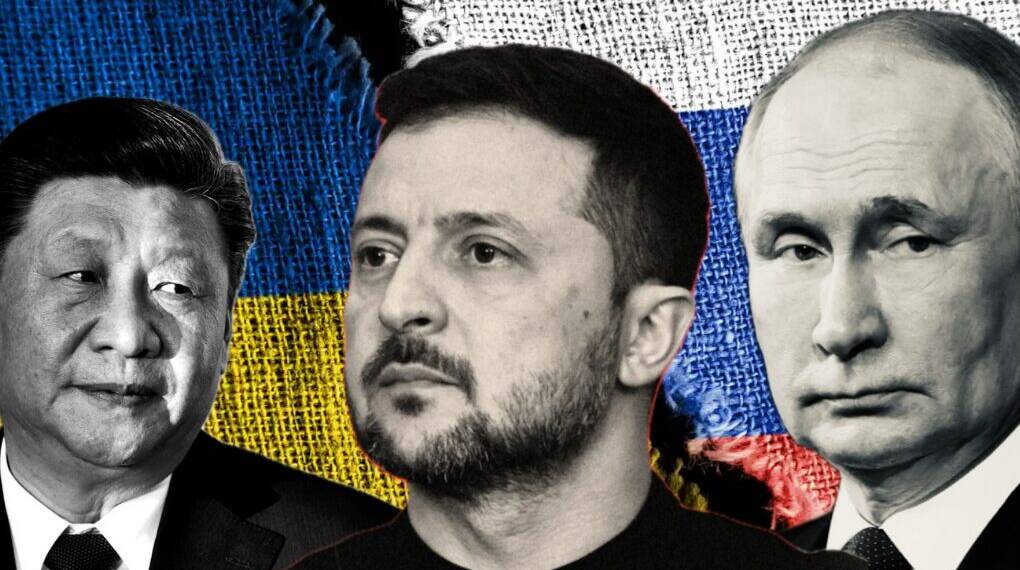Russia’s move to align closely with China as a strategic security guarantor amid the ongoing Ukraine crisis marks a significant shift in international alliances. But why China, and why has Ukrainian President Volodymyr Zelenskyy refused to accept China in this role? The answers lie in a mix of strategic necessity, geopolitical calculations, and trust—or the lack thereof.
Ukraine’s European allies are formulating plans, with U.S. support, for how to guarantee the country’s future security and deter Russian aggression. One option under discussion is a collective defense agreement, similar to NATO’s Article 5.
The future of Ukrainian security and territorial control are the two central issues in the emerging peace process brokered by President Donald Trump, but Ukraine and Russia currently remain far apart on both.
What Makes China Russia’s Choice?
Faced with increasing isolation from the West due to sanctions and diplomatic pressure, Russia has few viable global partners who can offer genuine economic and political backing. China stands out largely because of its unmatched economic clout, diplomatic reach, and a shared interest in challenging Western dominance.
Economically, China provides Russia access to alternative trade routes and financial systems, allowing Moscow to soften the blow of sanctions targeting its energy exports and critical industries. The partnership offers a lifeline for Russian economic survival while maintaining the funds necessary for Kremlin’s military ambitions.
Strategically, Russia and China share a vision that challenges NATO’s expansion and U.S. global influence. Both nations emphasize respect for sovereignty and oppose what they call unilateral interference in domestic affairs. By choosing China, Russia is not only securing practical support but also projecting an image of a multipolar world order where Western hegemony is more constrained.
Why Is Zelenskyy Skeptical?
For Ukraine, however, placing trust in China as a security guarantor is fraught with difficulty. Although China claims neutrality, Kyiv remains deeply suspicious of Beijing’s close ties with Moscow. China’s muted response to Russia’s invasion and its blocking of UN resolutions critical of Russia have reinforced Ukraine’s doubts about Beijing’s fairness.
More critically, Zelenskyy sees a Chinese security role potentially as a way to legitimize Russia’s territorial gains. Accepting this would weaken Ukraine’s claims to its own territory and could institutionalize Moscow’s advantages rather than secure Ukraine’s long-term sovereignty.
Instead, Zelenskyy has focused on strengthening bonds with Western nations, which have provided essential military aid and economic support. He fears that engaging China could dilute this vital Western backing and risk sidelining Kyiv’s preferred diplomatic framework.
China’s Response
China said it is open to playing a “constructive role” in resolving the Ukraine war after Russia suggested Beijing could be one of the guarantors of Ukrainian security under a peace deal — a proposal Kyiv rejected.
Russian Foreign Minister Sergey Lavrov suggested that permanent UN Security Council members, which include China, could underpin a security guarantee for Ukraine under a settlement that ends Moscow’s invasion. China is a major strategic partner of Russia, and has supported its sanctions-hit economy with large-scale purchases of oil.
Therefore, Zelensky has blamed China for not helping to stop the Russian invasion in 2022, and for subsequently aiding Moscow.
In addition to this Zelensky said that China “helped Russia by opening the drone market. Also China had endorsed the 1994 Budapest Memorandum—in which post-Soviet Ukraine gave up its nuclear weapons in exchange for assurances about its security—but did not act when Russia occupied Crimea in 2014.
China was not a signatory to the Budapest Memorandum, but had recognized it in a government statement at the time.
Zelensky said Kyiv needs security guarantees from states that are willing to help in practice, and which have supported it during Russia’s ongoing invasion, according to The Kyiv Post.
A Complex Triangular Dynamic
This dynamic effectively frames the conflict as a broader geopolitical struggle, with China’s rising influence juxtaposed against continued Western support for Ukraine. Russia’s choice of China complicates peace prospects by introducing a strategic actor whose priorities may diverge significantly from Ukraine’s goal of restoring full territorial sovereignty.
For the West, this means vigilance is required to counterbalance Chinese diplomatic activism while bolstering Kyiv’s defense capabilities and international legitimacy. For Kyiv, rejecting China as a guarantor safeguards its sovereignty narrative but also risks narrowing diplomatic options.
Russia’s selection of China as a security partner in the Ukraine conflict stems from pragmatic needs for economic and strategic support amid Western isolation and shared opposition to NATO expansion. Conversely, Zelenskyy’s refusal to embrace China signals deep mistrust of Beijing’s alignment with Moscow and an intent to maintain strong Western alliances crucial for Ukraine’s survival and future. This divergence highlights how the Ukraine war remains entwined with the evolving global power balance, where allies and adversaries navigate complex security calculations beyond the battlefield.








